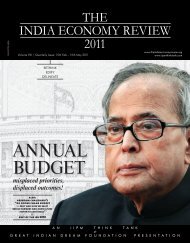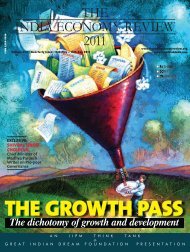Download - The India Economy Review
Download - The India Economy Review
Download - The India Economy Review
You also want an ePaper? Increase the reach of your titles
YUMPU automatically turns print PDFs into web optimized ePapers that Google loves.
P LANNING P ARADIGM<br />
made for enabling the representatives<br />
of these professions to infl uence the<br />
health policy of the country;<br />
5. In view of the complexity of modern<br />
medical practice, from the standpoint<br />
of diagnosis and treatment, consultant,<br />
laboratory and institutional facilities of<br />
a varied character, which together con-<br />
stitute “group” practice, should be<br />
made available;<br />
6. Special provision will be required for<br />
certain sections of the population, e.g.<br />
mothers, children, the mentally defi -<br />
cient etc.,<br />
7. No individual should fail to secure ad-<br />
equate medical care, curative and preventive,<br />
because of inability to pay for<br />
it and<br />
8. <strong>The</strong> creation and maintenance of as<br />
healthy an environment as possible in<br />
the homes of the people as well as in all<br />
places where they congregate for work,<br />
amusement recreation, are essential. 1<br />
It further emphasized a need for a comprehensive<br />
and universal health care<br />
system, and it made recommendations<br />
concerning the<br />
district health scheme and<br />
health organization to provide<br />
integrated health services<br />
— curative, preventive<br />
and promotive — to the entire<br />
population. If implemented,<br />
these measures<br />
would have been <strong>India</strong>’s fi rst<br />
steps to realize universal access.<br />
<strong>The</strong> health care facilities<br />
112 THE IIPM THINK TANK<br />
that existed in <strong>India</strong> at the time of the<br />
Bhore Committee were embarrassingly<br />
inadequate. In fact, most of these were in<br />
urban areas and largely in enclaves of the<br />
British Civil administration and Canton-<br />
ments. 2<br />
<strong>The</strong> Committee categorically states,<br />
"we are satisfi ed that our requirements<br />
can only be met satisfactorily by the development<br />
and maintenance of a state<br />
Health Service." 3 It recommended that all<br />
services provided by the health organiza-<br />
No individual should fail to secure<br />
adequate medical care, curative and<br />
preventive, because of inability to pay<br />
tion should be free to the population<br />
without distinction and it should be fi -<br />
nanced through tax revenues. 4 It further<br />
recommended that the health service<br />
should be a salaried service with wholetime<br />
doctors who should be prohibited<br />
from private practice. 5<br />
<strong>The</strong> Bhore Committee<br />
ends its report on a clear<br />
note of urgency for implementation<br />
of the plan<br />
in its full form:<br />
<strong>The</strong> existing state<br />
of public health in the country is so unsatisfactory<br />
that any attempt to improve the<br />
present position must necessarily involve<br />
administrative measures of such magnitude<br />
as may well seem to be out of all proportion<br />
to what has been conceived and accomplished<br />
in the past. This seems to us inevitable,<br />
especially because health administration<br />
has so far received from governments<br />
but a fraction of the attention that it deserves<br />
in comparison with other branches<br />
of governmental activity. We believe that we<br />
have only been fulfi lling the duty imposed<br />
on us by the Government of <strong>India</strong> in putting<br />
forward this health programme, which can<br />
in no way be considered as extravagant either<br />
in relation to the standards of health<br />
administration already reached in many<br />
other countries or in relation to the minimum<br />
requirements of any scheme which is<br />
intended to demonstrate an appreciable<br />
improvement in the health of the community.<br />
For reasons already set out, we also<br />
believe that the execution of the scheme<br />
should not be beyond the fi nancial capacity<br />
of governments.<br />
We desire to stress the organic unity of the<br />
component parts of the programme we<br />
have put forward. Large-scale provision<br />
for the training of<br />
health personnel forms an<br />
essential part of the<br />
scheme, because the organization<br />
of a trained<br />
army of fi ghters is the<br />
fi rst requisite for the successful<br />
prosecution of<br />
the campaign against<br />
diseases. Side by side<br />
with such training of<br />
personnel, we have provided<br />
for the establishment<br />
of a health organization<br />
which will bring





